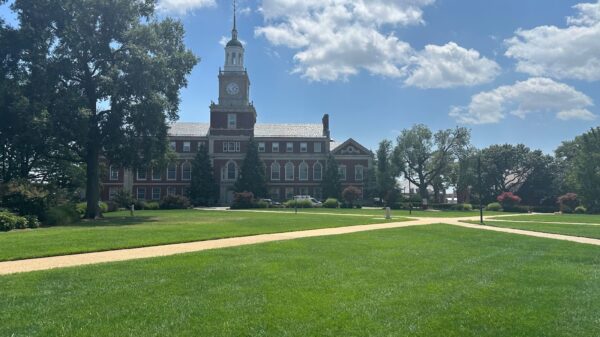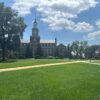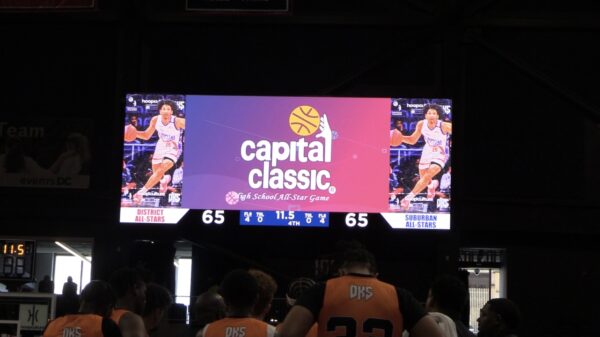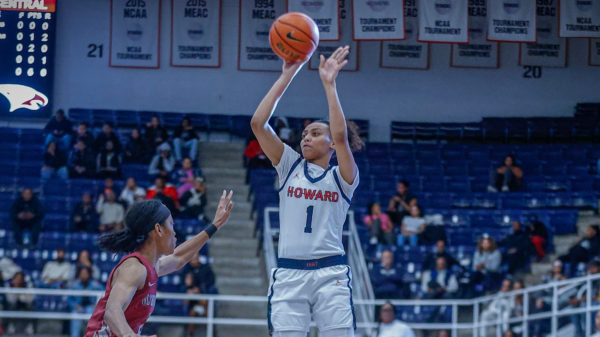Student leaders and members of Howard’s administration met briefly Tuesday, Oct. 26, in what students thought would be a discussion about the now two-week-old protest. Instead, Howard officials presented future plans for the University’s development, and emphasized that issues like mold and housing numbers may continue in the future.
Though the administration mainly focused on future plans for the University during the meeting, they briefly touched on mold in dorms, and what they say is not a housing crisis. Both issues are at the center of the demands listed by student protesters currently occupying the Armour J. Blackburn Center.
President Wayne A. I. Frederick emphasized during the meeting on Tuesday that the administration only found 38 reports of mold in dorms throughout the campus. Citing the wet and humid weather conditions on buildings that were not occupied for over a year, Frederick claimed that mold in dorms would not be an isolated problem.
“We’re going to have more,” Frederick said.
In regards to the alleged housing crisis on campus, Frederick and Executive Vice President Dr. Tashni-Ann Dubroy, both claimed there is more to the story about housing availability on campus.
“When we say we have a housing crisis, we have to be clear on what that is,” Frederick said during the meeting on Tuesday.
Frederick then took time to address claims that Howard selling former dorms like Lucy Diggs Slowe Hall and Meridian Hill Hall led to a housing shortage on campus. Howard did not sell these dorms. According to Frederick, the repairs that needed to be made to both buildings were beyond the scope of what the University could afford at the time. Instead of repairing or selling the properties, the University leased these buildings as a form of immediate revenue. The revenue gained from these leases were used to fund renovations of facilities on campus like the Undergraduate Library.
Dubroy explained why emergency housing became available at the beginning of the semester, despite juniors and seniors being told they would have to find housing elsewhere due to limited space on campus.
Dubroy said the University does not always know how many rooms they will have available until they receive an official count for the amount of incoming students who will stay on campus. The University was presented with greater difficulty this year to determine this number due to COVID-19 and admitted students who submitted their housing deposits but decided to go elsewhere.
A majority of Tuesday’s meeting was consumed by a presentation given by the executive director of Real Estate Development and Capital Asset Management , Derrek Neic-Williams on the 2020 Central Campus Master Plan. The District of Columbia Municipal Regulations require all colleges and universities within D.C. to submit campus master plans every ten years. These plans must be approved by zoning commissioners and must adhere to Subtitle Z § 302.
Howard University’s master plan, which was introduced in 2020, includes future major developments to the campus that will enhance both the on campus and academic student experience. The plan includes a new teaching hospital, an integrated Health Sciences Complex and STEM Center, a Center for Arts and Communications and a two-phase housing community on Sherman Avenue. Nothing shown throughout the presentation addressed current issues and student uproar on campus.
While the administration did not answer questions during the presentation, they did allow some time to ask prepared questions. Following the presentation on the master plan, student leaders in attendance had the last couple of minutes remaining to ask questions.
HUSA President Kylie Burke said in a statement that she was disappointed in the lack of a meeting agenda.
“Rather than providing an open forum for present student leaders to ask their own prepared
questions, the meeting consisted almost entirely of a ‘University Master Plan’ presentation. For additional and noteworthy context, the attending student leaders were sent a blank meeting invitation with less than 24-hours notice, were not provided an agenda beforehand, nor were we notified of the presentation format,” the HUSA statement read.
Lauren Berry, Miss Residence Life and Miss College of Nursing and Allied Health Sciences, was also at the meeting and presented concerns regarding its format.
“We all entered the space prepared to amplify the voices and concerns of the students, it was disappointing to see that we weren’t allotted ample time to advocate, inquire or suggest, on behalf of our student body,” Berry said.
On Thursday morning, two days after the meeting, the administration hosted a second gathering to allow students to raise questions they were not able to ask during the first meeting.
During Thursday’s meeting, Frederick continued to define what he has framed as Howard’s housing crisis, and detailed the administration’s productivity with long-term leasing opportunities to expand dormitory development. Frederick mentioned the University’s relationship with housing partners and the rigorous process to find partners who are willing to take the risk with Howard’s development plans.
These practices have been implemented to financially support the University’s goals for on-campus housing. “We don’t charge enough tuition to build,” Frederick said.
Frederick and the present administrators continued to describe how long-term lease opportunities provide financial gain upfront that can be allocated to building development and inward to the university. They communicated during the meeting that there are dorms currently under 40-year leases.
Frederick also briefly discussed his desires and hesitations regarding the opportunity for students to directly address their concerns during a town hall; one of the original demands of the student protesters. The president said that his preference is to address smaller groups of students or a more controlled forum to avoid “back and forth” confrontational dialogue. Frederick expressed acceptance of a virtual town hall forum.
“I do feel comfortable with a controlled format,” Frederick said, “it’s not about control, but being effective.”
When asked if he had any other alternatives to the student’s demand for an in-person town hall, Frederick responded that he has no other alternatives to propose at this time.
Copy edited by: N’dia Webb









